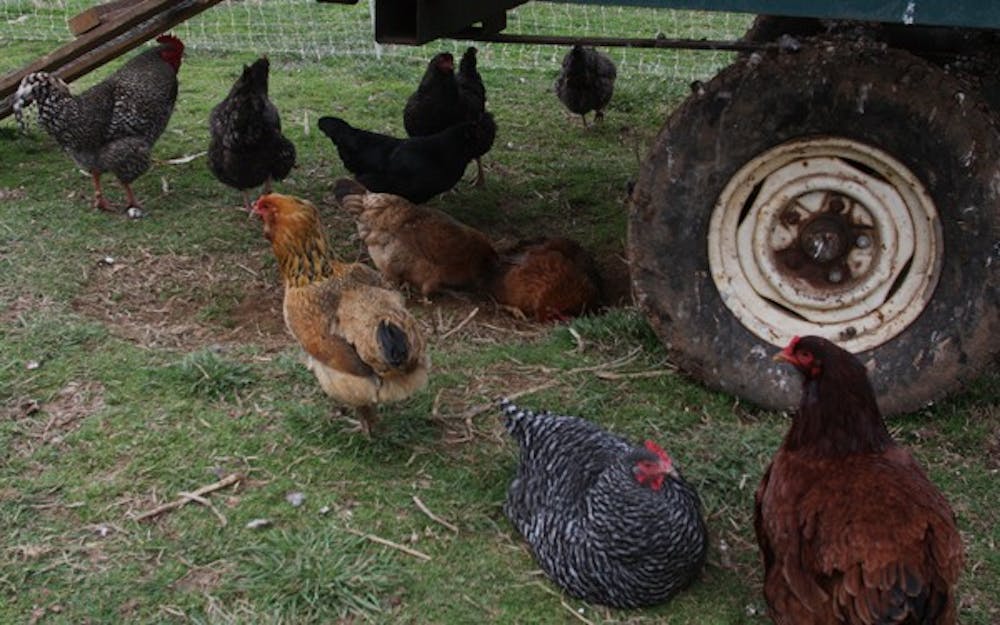1.5.0., the newest restaurant at Lenoir Mainstreet, is known for advertising the farms its products come from and how the food being served each day was grown or raised.
“We can source it all the way to the ground,” said Bill Cunningham, resident district manager for Carolina Dining Services.
The reason why is reflected in the restaurant’s name. Those numbers represent the 150-mile radius that serves as Carolina Dining Services’ definition for what is considered local food.
CDS has worked hard to make 1.5.0. a successful venture by finding farmers and distributors for executive chef Paul Basciano to work with to keep the food that’s served local and sustainable.
“The growth in this market has been tremendous,” said Matt Tunnell, who represents FreshPoint, a fresh produce distributor that works with UNC. “In the last five years, it’s probably grown 100 percent, probably more than that.”
Tunnell worked previously as a food service marketing specialist for the N.C. Department of Agriculture and Consumer Services.
Demand for local and organic food makes up at least 15 percent of FreshPoint’s business.
“We’re responding to demand from the market,” Tunnell said.
A 2008 survey conducted by the National Restaurant Association showed that the No. 1 trend among chefs was using local produce.
According to the association’s research, 89 percent of fine-dining operators served locally sourced items, and nine in 10 believed demand for locally sourced items would grow in the future.
“Compared to organic, there is a lot more demand for local. Local food is seen as more sustainable, and it keeps money in the state and in the community,” Tunnell said.
Average weekly purchases for local, organic or sustainable food for Carolina Dining Services since January has totaled about $18,200, but that number could fluctuate based on the time of year.
When UNC places an order with Eastern Carolina Organics, an organic farm produce distributor roughly 20 miles from campus, many items are still in the fields. The produce is received, quality-checked and stored, going to customers within 1 to 2 days after arrival.
“Seasonality affects local food purchasing, and these numbers only reflect from January to March, so during spring semester, that average will increase,” said RJ LaPorte, marketing coordinator for Carolina Dining Services.
“Paul Basciano has had a challenge with seasonality, but it’s been interesting — he’s been able to create a new menu, tapping into his skills as a chef to find new and interesting things to do.”
Cane Creek Farm
Location: Snow Camp, 25 miles from UNC campus
“I know every single thing about every animal here. I’m authentic and I’m accountable,” said Eliza MacLean, who co-owns Cane Creek Farm.
The farm supplies beef and pork for 1.5.0. MacLean said the farm typically has 400 cows and 300 pigs on about 550 acres of land during the growing season.
Cane Creek’s animals are not kept in confinement — they have free range to graze, root and wallow. The pigs have access to fresh water and are either hand-fed or have free access to grain-based food.
The sheep, cows, and goats are all grass-fed, and MacLean makes sure that the feed does not contain antibiotics or animal by-products.
“We get orders on Monday and deliver on Wednesday to Chapel Hill. We’re just 20 minutes down the road,” MacLean said. “The way we raise our animals is incredibly expensive. We’re not a middleman — this is a cash cow operation. Selling directly is the only way to make money if you want to be small.”
Supplying the University with food that meets 1.5.0.’s needs has been helpful in generating business for small farms like MacLean’s.
“This business is incredible for us,” MacLean said. “This is definitely one of our largest accounts.”
Because of UNC’s lack of demand for local food in the summer months, farmers like MacLean are also likely to lose a large account when May comes around.
“Things will get tricky in the summer when the demand isn’t there. Working on a contractual relationship would be ideal,” MacLean said.
Eastern Carolina Organics
Location: Pittsboro, 18.5 miles from UNC campus
Eastern Carolina Organics is a North Carolina marketer and distributor of organic farm produce that sells to 1.5.0. and promotes a similar ability to benefit farmers directly, touting that “80 percent of our sales go right back to our growers.”
Most of the items on ECO’s availability list are still in the fields when UNC places an order. After orders come to the office, ECO calls growers to tell them what to harvest. The produce is received, quality-checked and stored, going to customers within 1 to 2 days after arrival.
Times are tough during this stretch of the year for local farmers growing produce — the transition time between winter crops and spring seeding is a notoriously slow period for sales.
“Right now it’s mostly sweet potatoes, collards, kale, mustard greens. Growers are cleaned out now and getting ready for spring,” said Sandi Kronick, CEO of ECO.
Mays Meats
Location: Taylorsville, 138 miles from UNC campus
Started nearly 30 years ago as a custom slaughterhouse and meat processing company by Wayne Mays and his wife, Margie, the company is now owned and run by sons Jim and Mike Mays.
“We work exclusively with local farmers, and it’s a lot of all-natural and grass-fed beef. The demand for this has just gotten bigger and bigger in the last five to 10 years,” Mike Mays said.
Mays Meats’ livestock processing focuses primarily on beef, pork and lamb, but the North Carolina distributor also supplies some of 1.5.0.’s demand for local chickens.
“We’ve probably already sold Carolina Dining Services around 1,500 or more pounds of chicken in the last 90 days or so since we started working with UNC,” Jim Mays said.
Contact the University Editor at udesk@unc.edu.




